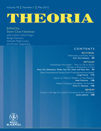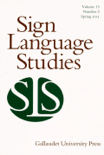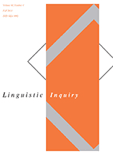
LINGUISTICS AND PHILOSOPHY
Scope & Guideline
Illuminating the Interplay Between Words and Wisdom
Introduction
Aims and Scopes
- Semantics and Pragmatics:
A core focus of the journal is the study of semantics and pragmatics, examining how meaning is constructed and understood in language. This includes the exploration of modal expressions, presuppositions, implicatures, and context-sensitivity. - Cross-Linguistic Perspectives:
The journal frequently includes studies that take a cross-linguistic approach, analyzing how different languages encode meanings and how these differences can inform broader theoretical frameworks in linguistics and philosophy. - Philosophical Implications of Language:
Research often investigates the philosophical implications of linguistic phenomena, such as the nature of truth, reference, and the relationship between language and thought. - Cognitive and Experimental Approaches:
The journal also encourages research that employs cognitive and experimental methodologies to investigate linguistic behavior and the underlying cognitive processes. - Interdisciplinary Research:
The journal promotes interdisciplinary research that bridges linguistics, philosophy, cognitive science, and related fields, fostering a comprehensive understanding of language and its functions.
Trending and Emerging
- Contextualism and Context-Sensitivity:
There is a growing emphasis on contextualism and the role of context in understanding meaning, as evidenced by numerous papers exploring context-sensitive expressions and their implications for semantics. - Modal and Epistemic Semantics:
Recent works have increasingly focused on modal and epistemic semantics, examining how modality interacts with other semantic components, which is crucial for understanding language's expressive capabilities. - Pragmatic Theories and Inferences:
The exploration of pragmatic theories, particularly concerning implicature and inference, is on the rise, reflecting a renewed interest in how speakers derive meaning beyond literal interpretations. - Cognitive and Experimental Linguistics:
There is a noticeable trend towards integrating cognitive and experimental approaches in linguistic research, suggesting an increased interest in empirical methods to explore theoretical questions. - Interdisciplinary Approaches to Meaning:
The journal is increasingly publishing interdisciplinary research that connects linguistic meaning with cognitive science, philosophy of mind, and social dynamics, indicating a broader conceptualization of language.
Declining or Waning
- Traditional Syntax:
There has been a marked decrease in papers focusing exclusively on traditional syntactic theory, indicating a shift towards semantics and pragmatics as primary concerns in the journal. - Historical Linguistics:
Research in historical linguistics and language change has become less prominent, suggesting that current scholarship is more oriented towards contemporary issues in semantics and philosophy. - Formal Semantics without Pragmatic Context:
Papers that strictly adhere to formal semantics without addressing pragmatic implications are appearing less frequently, reflecting a growing recognition of the importance of context in understanding meaning. - Philosophical Linguistics as a Standalone Discipline:
The intersection of philosophy and linguistics is increasingly integrated with other disciplines, leading to fewer works that treat philosophical linguistics as an isolated field.
Similar Journals

Journal of Logic Language and Information
Exploring the Nexus of Logic, Language, and InformationThe Journal of Logic Language and Information, published by SPRINGER, stands as a leading interdisciplinary platform dedicated to the exploration of the interconnections between logic, language, and information theory. With a history spanning from 1992 to 2024, this esteemed journal provides a vital forum for researchers, professionals, and students in fields such as Computer Science, Linguistics, and Philosophy. Notably recognized in the 2023 rankings, it holds a Q2 quartile in Computer Science (miscellaneous) and Q1 quartiles in both Linguistics and Language, and Philosophy, reflecting its high academic quality and relevance. Despite its nuanced focus, the journal's diverse scope attracts a global readership, encouraging innovative research and critical discourse. Although it is not an Open Access publication, the Journal's valuable contributions can be accessed through various institutional subscriptions, ensuring that its scholarly output remains influential within the academic community.

Voprosy Yazykoznaniya
Fostering Scholarly Dialogue in Language StudiesVoprosy Yazykoznaniya, published by the esteemed Russian Academy of Sciences and the State Academy of Humanities (GAUGN), stands as a leading journal in the field of linguistics and language studies. With an impressive Q2 rank in Linguistics and Language for 2023 and a strong position within Scopus rankings, this journal fosters scholarly dialogue and pushes the boundaries of linguistic research by providing a platform for innovative studies, reviews, and analyses. Although not open access, its publication ensures high academic standards and visibility within the global academic community. Researchers, professionals, and students alike can benefit from the rich insights and diverse perspectives presented in this journal, serving as a vital resource for anyone interested in the intricacies of language and its role in society. Operating since 2009 and continuing to 2024, Voprosy Yazykoznaniya is an essential reference point for contemporary linguistic scholarship in the Russian Federation and beyond.

Yuyan Kexue-Linguistic Sciences
Exploring the Frontiers of Linguistic KnowledgeYuyan Kexue-Linguistic Sciences, published by SCIENCE PRESS, is a pivotal academic journal dedicated to the field of linguistics. With its ISSN of 1671-9484, this journal seeks to explore and illuminate various linguistic phenomena, contributing significantly to the understanding of language in both theoretical and applied contexts. Emphasizing interdisciplinary research, it welcomes contributions that bridge linguistics with areas such as cognitive science, sociology, and communication studies. Although it currently does not offer open access, Yuyan Kexue-Linguistic Sciences aims to provide a platform for researchers, professionals, and students alike to engage with cutting-edge studies and emerging trends in linguistics. Its publication location in Beijing positions it as a vital contributor to the global discourse in the linguistic sciences, catering to both a national and international audience. As the journal continues to grow, it aspires to maintain high academic standards and foster scholarly exchange for years to come.

Natural Language Semantics
Charting New Territories in Semantic ResearchNatural Language Semantics, published by Springer, is a premier journal that has established itself as an essential platform in the fields of linguistics and philosophy. Since its inception in 1992, the journal has dedicated itself to advancing the understanding of natural language meaning through rigorous research and innovative methodologies. With its impressive Q1 ranking in both Linguistics and Language and Philosophy as of 2023, and a notable Scopus ranking in the 85th percentile within the Arts and Humanities, this journal is at the forefront of scholarly discourse. Authors and researchers contribute high-impact, peer-reviewed articles that explore topics ranging from semantics, pragmatics, to the intersections of philosophy of language. Though not an open-access publication, it provides maximum accessibility through various distribution channels, ensuring widespread dissemination of knowledge. Researchers, professionals, and students will find Natural Language Semantics a critical resource that not only informs but also inspires future inquiry in the analysis of meaning.

Rivista Italiana di Filosofia del Linguaggio
Fostering Critical Discourse in Linguistic StudiesRivista Italiana di Filosofia del Linguaggio is a prominent academic journal dedicated to the exploration of linguistic philosophy and its intersections with various fields of study, such as linguistics, cognitive science, and semiotics. Published by UNIV STUDI CALABRIA, this journal seeks to foster scholarly discourse and critical analysis by providing a platform for innovative research and theoretical perspectives. With an expectation of rigorous peer review, the journal welcomes contributions that dissect the intricate relationship between language and thought, promoting a deeper understanding of linguistic phenomena. Although Rivista Italiana di Filosofia del Linguaggio operates under a traditional subscription model, its commitment to high-quality scholarship makes it a vital resource for researchers, professionals, and students alike who are engaged in the burgeoning field of linguistic philosophy. Based in Italy, and specifically located at CAMPUS ARCAVACATA, VIA PIETRO BUCCI, ARCAVACATA DI RENDE CS 87036, this journal continues to expand its international reach by attracting contributions from diverse academic backgrounds.

Acta Analytica-International Periodical for Philosophy in the Analytical Tradition
Cultivating a vibrant community of analytical thinkers.Acta Analytica is a premier international periodical dedicated to advancing the field of philosophy within the analytical tradition. Published by SPRINGER in the Netherlands, this journal has steadily established itself as a vital resource for scholars and practitioners, evidenced by its prestigious Q1 categorization in the 2023 Philosophy rankings and an impressive Scopus rank of #183 out of 806 in the Arts and Humanities category, placing it within the 77th percentile. With coverage spanning from 2009 to 2024, the journal encompasses a broad spectrum of philosophical discourse that fosters dialogue and encourages intellectual rigor among its contributors and readers alike. Although not an open-access journal, it ensures quality and accessibility to an audience passionate about the analytical approach to philosophical questions. Acta Analytica invites researchers, professionals, and students to engage with its rich and thought-provoking content, making it an essential addition to any philosophy-oriented collection.

Theoria-A Swedish Journal of Philosophy
Fostering Critical Thought and Innovative PerspectivesTheoria - A Swedish Journal of Philosophy, published by WILEY, stands as a significant contributor to the realm of philosophical discourse since its inception in 1935, with a continued commitment to advancing scholarly conversation up to 2024. With its ISSN 0040-5825 and E-ISSN 1755-2567, the journal holds a prestigious position in the field, ranking in Q2 among philosophy journals and achieving an impressive 66th percentile ranking in the Scopus Arts and Humanities category. Although it does not currently provide Open Access options, Theoria remains a vital resource for researchers, professionals, and students seeking in-depth analyses and innovative perspectives within contemporary philosophy. Its central objective is to foster rigorous academic dialogue that explores diverse philosophical inquiries, making it an essential platform for those invested in the pursuit of knowledge and critical thought.

Logic and Logical Philosophy
Advancing Philosophical Inquiry through LogicLogic and Logical Philosophy is a distinguished journal published by Nicolaus Copernicus University Torun, Poland. With its ISSN 1425-3305 and E-ISSN 2300-9802, the journal has established itself as a premier outlet for cutting-edge research in the field of philosophy, specifically focusing on the intricate intersections of logic and philosophical inquiry. Since its inception, the journal has consistently demonstrated its impact within the academic community, achieving a commendable Q1 ranking in the 2023 Arts and Humanities category, placing it in the 73rd percentile of publications in the field. The journal aims to foster scholarly dialogue and contribute significantly to the advancement of philosophical understanding through rigorous research articles, critical reviews, and discussions. With a commitment to high academic standards and accessibility—though specific access options may vary—Logic and Logical Philosophy remains an essential resource for researchers, professionals, and students alike, paving the way for innovative philosophical discourse until 2024 and beyond.

Sign Language Studies
Innovating linguistic studies through sign language.Sign Language Studies is a prestigious peer-reviewed journal dedicated to advancing the field of sign language research and the linguistic studies surrounding it. Published by Gallaudet University Press, this journal stands out in the realms of Linguistics and Language, being classified within the Q2 category as of 2023, which underscores its influence and relevance within academic circles. Operating under the ISSN 0302-1475 and E-ISSN 1533-6263, the journal has a remarkable Scopus ranking that positions it in the top 20% within the disciplines of Arts and Humanities and Social Sciences, attesting to the high quality and impact of its publications. Spanning a comprehensive timeline from 2002 to 2024, Sign Language Studies invites researchers, professionals, and students to engage with cutting-edge research, theoretical frameworks, and practical studies that contribute to our understanding of sign languages, their structure, use, and the communities they serve. This makes it an essential resource for those committed to the exploration and appreciation of sign language within both linguistic and social contexts.

LINGUISTIC INQUIRY
Innovating Conversations in Language StudiesLINGUISTIC INQUIRY is a premier journal published by MIT PRESS, representing a critical platform for the advancement of research in the fields of linguistics and language studies. With an impressive Q1 category ranking in both linguistics and language disciplines for 2023, and ranking #149 in Arts and Humanities and #174 in Social Sciences according to Scopus metrics, this journal stands at the forefront of academic conversations around language theory, analysis, and application. LINGUISTIC INQUIRY caters to a diverse audience of researchers, professionals, and students, providing a robust forum for original research articles and theoretical discussions that push the boundaries of our understanding of language. While the journal currently does not offer open access, it remains an essential resource for those engaged in cutting-edge linguistic research. The journal's continuous publication since 1996 demonstrates its long-standing commitment to linguistic scholarship and innovation.